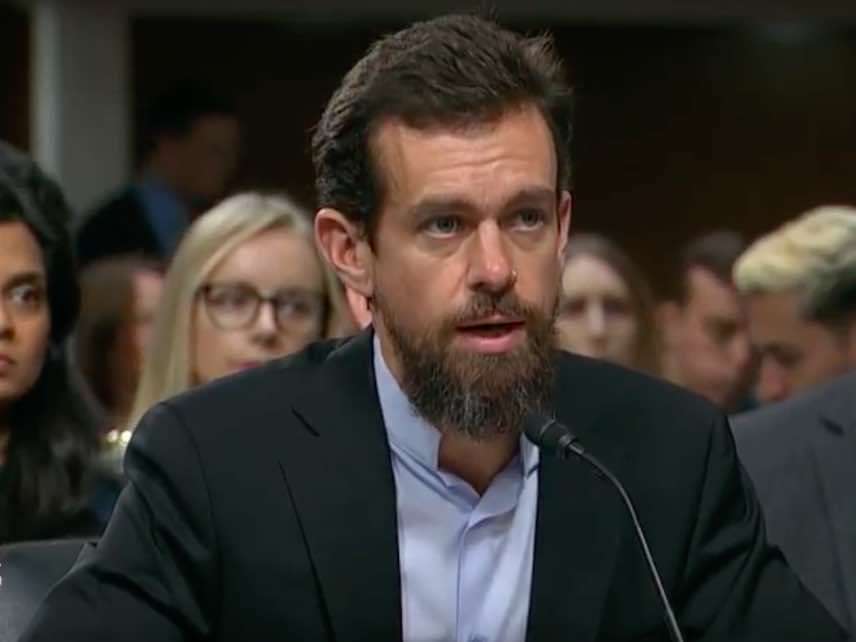Senators Want Facebook and Twitter to Ignore Demands from Authoritarian Governments, Except Ours
Tom Cotton to Jack Dorsey: "Do you prefer to see America remain the world's dominant global superpower?"

On Wednesday morning, Twitter CEO Jack Dorsey and Facebook COO Sheryl Sandberg appeared before the Senate Intelligence Committee to take questions from congressmen who spent most of the hearing demanding that the social media giants comply with U.S. government dictates while eschewing cooperation with any other government judged to be "authoritarian."
The senators were particularly concerned about foreign interference in U.S. elections. They wanted the social media companies to take firmer steps to prevent non-citizens from attempting to sway public opinion by creating fake accounts, spreading misinformation, or buying political ads.
Sen. Kamala Harris (D-Calif.) wanted to know exactly how much revenue Facebook had generated from the sale of illicit political ads, for instance, and Sen. Marco Rubio (R-Fla.) wanted a guarantee that the platforms' commitments to free expression would not get in the way of preventing this kind of thing in the future.
"You did say you were a global town square, you said Twitter was built on the core tenet of free expression," Rubio said to Dorsey. "We've learned the hard way that social media can be manipulated by bad actors to do harm. What we're asking you to do is use the powers you have within your platforms to crack down on certain actors."
At the same time, many senators were insistent that Twitter and Facebook should not cave to demands made by other governments. Repressive regimes in China, Vietnam, Turkey, and other places have also asked tech companies to purge certain kinds of content in exchange for being allowed to operate within said countries. Obeying these governments would be evil and wrong, said the senators. Obeying the U.S. government is smart and good, though.
Rubio, at least, was fully aware of this irony. He addressed it by asking Dorsey whether he agreed with the statement, "There's no moral equivalency between what we are asking you to do and what Turkey is asking you to do." Dorsey quickly agreed. He did, however, offer a partial defense of Twitter's decision to make certain accommodations for authoritarian nations like Turkey.
"We have evidence to show a lot of citizens in Turkey access that [purged] content through proxies," he said. "We have fought the Turkish government around their requests and often times won. We would like to fight for every single person being able to speak freely and see everything, but we realize it's going to take some bridges to get there."
That seems like a perfectly defensible strategy. The ideal situation would be for Facebook and Twitter to operate everywhere in the entire world, free of silly government-enforced constraints. Alas, that isn't even the case in the U.S., but it would be self-defeating for Facebook and Twitter to disband entirely unless they have total, perfect autonomy from governments. A Turkey with an imperfect, somewhat compromised Twitter is better off (and likely to have access to more information that can inform the citizenry as they seek greater freedoms) than a Turkey with no Twitter at all.
Google, which did not send a representative to the hearing despite requests from the U.S. government to do so, has cooperated with the Chinese government.
Sen. Tom Cotton (R-Ark.) had clearly been itching to grill Google about this, but had to settle with proxy questions for Dorsey and Sandberg.
"Would your companies every consider taking these actions [that Google has taken] that privilege a hostile foreign power over our men in uniform?" he asked. Sandberg and Dorsey confirmed that they would not.
Cotton also criticized the social media companies' view of themselves as global marketplaces of ideas.
"Do you prefer to see America remain the world's dominant global superpower?" Cotton asked Dorsey.
Twitter's CEO did his best to give an answer that was suitably pro-America, affirming that yes, Twitter is indeed an American company.
But those other governments, those are the authoritarian ones.
Watch the full hearing below:


Show Comments (79)